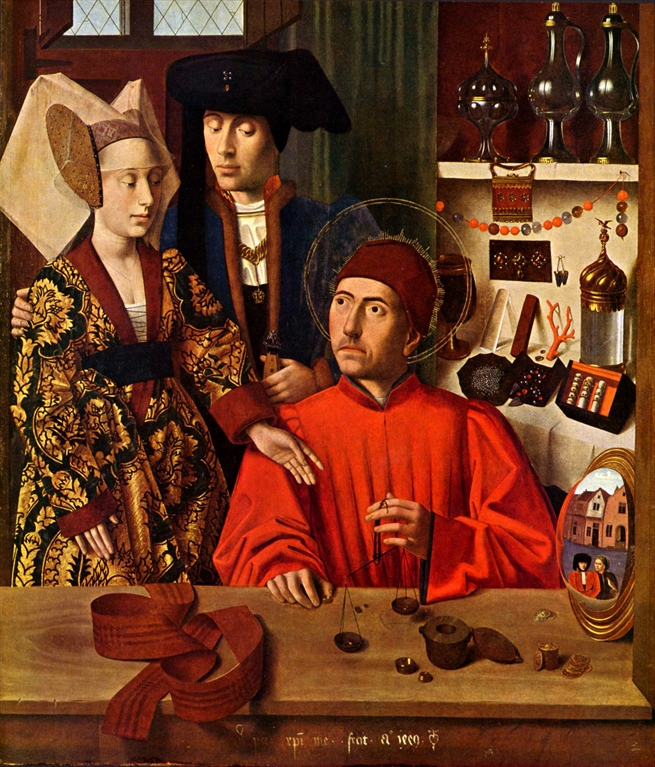
The Miracle of the Loaves and Fishes
Lambert Lombard
Oil on panel, 104 x 110 cm
Rockox House, Antwerp


St. Eligius was a seventh-century saint who lived in France. He was born around 588 AD in France, near Limoges. Eligius' father, Eucherius, apprenticed his young son to a goldsmith. Eligius took to smithing with gusto and, once he had finished his apprenticeship, he gained enough of a reputation that his name caught the ear of King Clotaire II of the Franks, who resided in Paris. Eligius crossed the Loire into the neighboring kingdom of the Franks, and Clotaire hired Elgius to make him a throne and provided him with the necessary gold and gems to construct something suitably grand. Eligius was such a skilled smith that he used the material Clotaire had given him for one throne and constructed two magnificent thrones out of them.
caught the ear of King Clotaire II of the Franks, who resided in Paris. Eligius crossed the Loire into the neighboring kingdom of the Franks, and Clotaire hired Elgius to make him a throne and provided him with the necessary gold and gems to construct something suitably grand. Eligius was such a skilled smith that he used the material Clotaire had given him for one throne and constructed two magnificent thrones out of them.
Clotaire was suitably impressed both by Eligius' designing ability and his honesty: Eligius could have simply pocketed the additional gold and precious jewels, but instead gave back the surplus to the king. Subsequently, Clotaire invited him to join the court as the master of the mint. Their honeymoon period did not last long, unfortunately, as Clotaire asked Eligius to swear an oath of allegiance. Eligius hesitated, as he was unsure whether or not Clotaire was going to use this oath for nefarious purposes. Eligius, as a member of the kingdom of the Merovingians, and not a subject of Clotaire who owed him his allegiance. Clotaire continued to press Eligius, annoyed that this otherwise loyal master of mint was resisting his will. Finally, Clotaire came to see that Eligius' refusal was not a matter of resistance, but a matter of conscience, as Eligius wanted nothing to stand in the way of his commitment to doing what he knew was his Christian duty, even his duty to his employer. King Clotaire was so impressed by Eligius' integrity, he embraced him, declaring to Eligius that his conscience was "a better pledge of fidelity than other men's oaths."
King Clotaire's son, Dagobert I, also admired Eligius and kept him in the royal household when his father died. Eligius became such a trusted advisor that he became sort of a gatekeeper to the royal presence. Many visitors stopped to see Eligius and ask for his counsel before reaching the king. The legend of St. Eligius' life details the many splendid monuments in Paris that Eligius crafted out of gold, including reliquaries for St. Martin of Tours and St. Denys.
Eligius dealt in fine things and became rich enough to acquire many fine things and great wealth of his own. Yet, he often gave away his riches in large sums. His home was identified by the crowds of the poor around his house. Eligius' desire to forswear worldly goods for the poor grew into a great desire to join the monastic life. Eligius and his fellow courtier, St. Audoneus, began to contemplate leaving the court to found monasteries. King Dagobert was reluctant to let them go, but eventually, he bequeathed to them estates that they could use to house their monastic communities.
Eligius founded the monastery of Solignac, which followed the joint rules of St. Columban and St. Benedict. Eligius realized that he needed less land than he originally had asked for from the king to complete his building projects, and returned to Dagobert, mortally contrite and begged his forgiveness for swindling him while asking him to take back the land. Dagobert responded: "Some of my officers do not scruple to rob me of whole estates, whereas Eligius is afraid of having one inch of ground which is not his."
Eligius and Audoneus became bishops of Noyon and Rouen, respectively and were consecrated in the year 635 or 641. Eligius' conscientiousness became a hallmark of his episcopacy, and he was highly regarded for his thoughtful pastoral care. He began missionary work into central Europe and cared for the poor and sick wherever he went.
St. Eligius died on December 1, 660. St. Eligius was a widely venerated saint during the middle ages throughout Europe. He is the patron saint of goldsmiths and blacksmiths and is especially honored by the guild of goldsmiths in Paris, where he spent much of his secular smithing career. Eligius provides an admirable model of how a Christian can work in and with the material world and yet continue to always serve God, not mammon.
The image above, "St. Eligius in his shop," by Petrus Christus, was accessed via Wikimedia Commons.
St. Eligius, honest smith and conscientious steward of Christ's flock—pray for us!